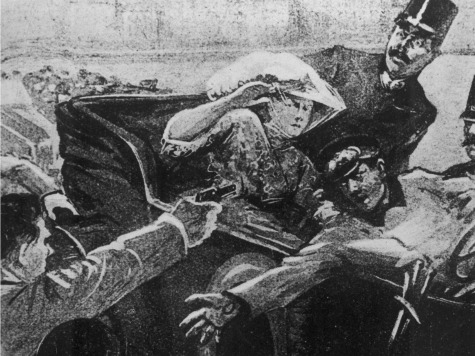This weekend’s centenary anniversary of the assassination of Austrian Archduke Prince Franz Ferdinand in Sarajevo, Bosnia–then a province of the doomed Austro-Hungarian empire–marked the event that triggered the greatest, most horrible occurrence of all time up to that point: World War I.
Nothing like World War I had ever been seen before–nor, in many ways, since. It was a war that defied prophecy and defeated all understanding. It was the first war to utterly escape the bounds of its authors and assume a terrible life of its own, a life that would consume a continent. It was a war that saw nearly every human endeavor go indescribably awry.
For all man’s reasoning and self-proclaimed ingenuity, all his science brought forth during those four hellish years was destruction beyond any and all imagining. Sacrifice was defined in millions upon millions of lost lives, tens of millions more crippled and wrecked lives–a thousand years of civilization reduced to smoldering ruins.
World War I was a war that produced horrific new weapons that forever demanded more and new victims. Underwater, terrifying new weapons eviscerated what was left of a seaman’s courage. On land, heavy artillery, fixed machine guns, and poison gas–especially poison gas–rendered pointless the soldier’s virtues of bravery, comradeship, and skill. In an age of flesh against steel and man against machine, man didn’t stand a chance.
It wasn’t just soldiers condemned to awaiting their grim fates inside their squalid horrid trenches with the arrival of each new day. No one alive in any of the belligerent nations could escape its impact. World War I was the first event in human history that truly did reach into houses down every street in every town and village.
The war uprooted tradition. It brought untold pain, indescribable hardship, and much opportunity to every corner of the globe it touched. But more than anything else, what World War I brought was change. World War I changed the world more than any event in history. Before the war, it was possible for people, nations, and even whole civilizations to think that tranquility and security were global norms that could always be restored when they broke down. No one who seriously observes the world since the guns of 1914 fell silent in November 1918 could risk such knavery.
Yet, in one of the war’s most unfashionable and politically incorrect ironies, World War I–the war that destroyed so much for so many–was also the war that rescued, at least for a time, the most sacred of all causes: liberty.
“The stern hand of fate,” said British Prime Minister David Lloyd George, “has scourged us to an elevation where we can see the great everlasting things which matter for a nation–the great peaks we had forgotten, of Honor, Duty, Patriotism, and clad in glittering white, the great pinnacle of Sacrifice pointing like a rugged finger to Heaven.”
Yet the cost of allied victory bore more heavily upon the victors than upon the vanquished. Between them, Germany and its allies in the Central Powers, Austria-Hungary, Turkey, and Bulgaria lost four million men. None of the three Central Powers empires, German, Austro-Hungarian, and Ottoman survived the war. Yet allied losses were greater still. Six million dead spread among the Entente powers of Russia, France, and Britain. (When the U.S. finally entered the war in 1917–not putting any armies into the field until May of 1918–it did so as an “associate power,” refusing to formally join the allies.)
The war transformed the Tzar’s corrupt, authoritarian, and retrograde Russia into a monstrously murderous revolutionary Soviet Union that bestrode the narrow world like a colossus, until its eventual collapse in 1989.
By far, France paid the highest price for victory: two million dead and five million wounded, in a country of only 40 million. The “Western Front” was France. Nearly the entire war in the West was fought on its soil. World War I was as devastating to France as World War II was to Russia–perhaps more so. Whereas the Soviet Union emerged from its trial by fire in 1945 as a global superpower, France limped to its World War I victory with wounds that these past 100 years have not been able to fully heal.
All began with two pistol bursts from the hands of a 19-year-old Serbian on the streets of Sarajevo exactly 100 years ago.

COMMENTS
Please let us know if you're having issues with commenting.